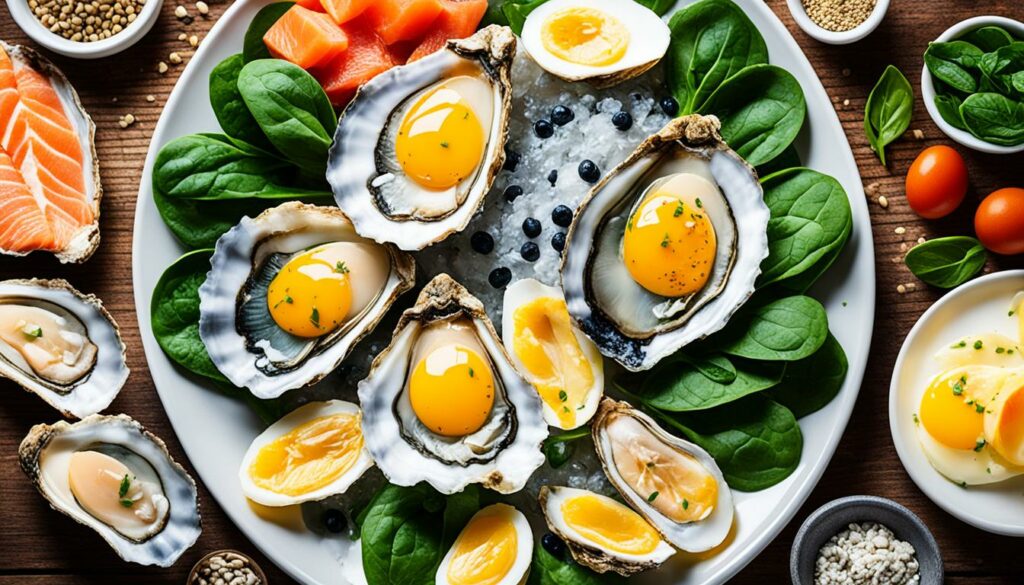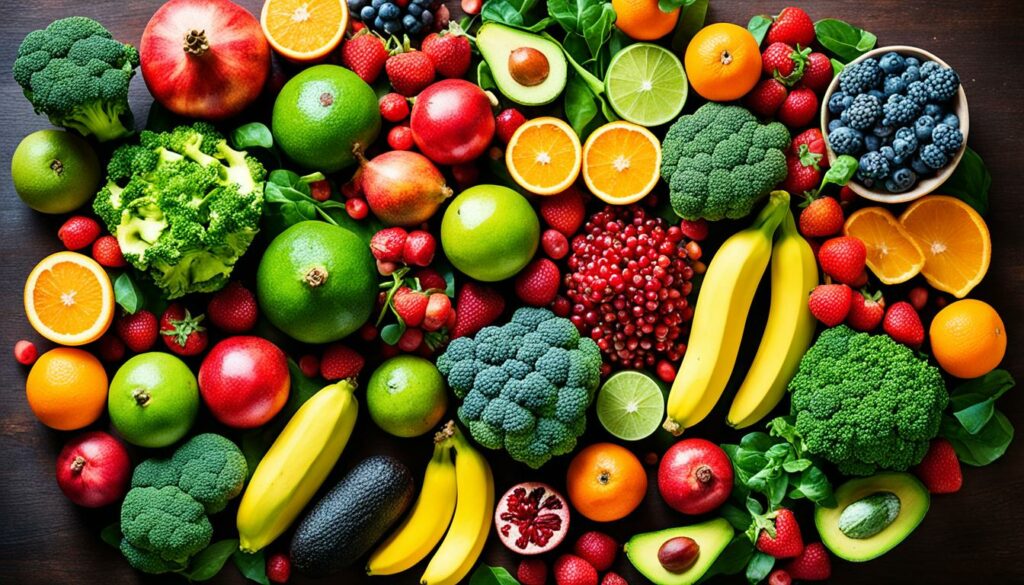Almost 25% of men over 30 face lower testosterone levels, which are key for muscle health and sex drive1. Adding foods that increase testosterone to your diet can help fight this reduction.
Think oysters full of zinc or leafy greens loaded with magnesium. These foods are gifts from nature for those wanting natural ways to boost testosterone levels. This article will explore foods that are great for boosting testosterone. These foods improve your health and help maintain your body’s hormonal balance.
Finding foods to enhance testosterone production is a long-term commitment. It’s not a quick solution. Studies show men eating more fats had testosterone levels about 60 points higher compared to those on low-fat diets.
Men following vegetarian diets had levels about 150 points lower1. We’ll shine a light on foods that promote higher testosterone levels. We’ll guide you through the top testosterone-boosting foods. We’ll also show how smart testosterone-boosting nutrition can bring back your youthful energy.
Key Takeaways
- Understanding the correlation between foods that increase testosterone and hormonal health
- Adopting natural ways to boost testosterone levels through dietary choices
- Exploring the best foods for boosting testosterone and their nutrient profiles
- How a testosterone-boosting diet can be a sustainable lifestyle change
- Identifying foods that promote higher testosterone levels and integrating them into daily meals
- Utilizing food sources for increasing testosterone to potentially mitigate the natural decline with age
- The importance of consistency and balance in testosterone-boosting nutrition
Understanding Testosterone and Dietary Impact
Testosterone plays a huge role in men’s health, with levels that should be between 300 to 1,000 ng/dl1. It’s vital for things like libido, muscle strength, bone health, and reproduction. Sadly, after 40, men lose about 1% of testosterone each year1. Gaining a lot of weight can make this drop faster1.
Diet greatly affects testosterone levels. A review from the UK showed that high-fat diets boost testosterone by about 60 points1. On the other hand, vegetarian men often have 150 points lower than those eating meaty, high-fat meals1. This shows fat intake and testosterone are linked, but more research is needed to understand fully1.
Eating a lot of inflammatory foods can increase the risk of low testosterone by almost 30%2. But, a ketogenic diet, rich in fats and low in carbs, raised testosterone significantly in a study with college guys2.
Diabetics following a keto diet also saw a big testosterone boost2. Additionally, diets high in fat and low in fiber led to higher testosterone, showing diet’s complex role2.
Despite what some believe, plant-based diets don’t really affect testosterone levels. Around 40–70mg of soy daily doesn’t change testosterone much. Supplements like selenium and zinc can help: selenium increased hormone levels in infertile men, while zinc deficiency lowers testosterone. Fenugreek seed extract also raised testosterone after 12 weeks2.
Knowing how diet and hormones interact is key for men. More research shows diet not just supports but changes testosterone levels. This affects men’s health broadly. Making smart food choices, thinking about supplements, and watching health can help manage testosterone with nutrition.
The Essential Role of Nutrients in Testosterone Production
Scientists are learning more about how diet affects hormone levels. They find that certain nutrients are key for making testosterone. This shows us how important a good diet is for men’s reproductive health and energy.

Zinc is closely linked to testosterone production. Men with low zinc have lower testosterone levels. But, if a man has enough zinc, adding more won’t raise his testosterone. This tells us it’s better to have a balanced diet than to take too many supplements3.
Why Zinc is Crucial for Reproductive Health
Zinc plays a big role in men’s reproductive health. It helps control testosterone levels. Seafood, especially oysters, are great for zinc. Just a small serving of oysters gives you a lot of the zinc you need each day4.
Magnesium: The Powerhouse Mineral for T-levels
Magnesium also affects testosterone. Taking magnesium supplements can raise testosterone levels. This helps with muscle health and hormone balance4. Studies show that men over 65 with more magnesium in their body also have more testosterone. This suggests magnesium can help men stay healthy longer4.
Importance of Fats: Omega-3s and Monounsaturated Fats
Fats are now seen as essential for hormone health. Omega-3s and monounsaturated fats are especially important. Eating these fats while avoiding processed and fried foods helps keep testosterone levels steady3.
A table shows how different fats affect testosterone. Foods rich in omega-3s and monounsaturated fats help maintain healthy testosterone. But, eating too much processed and fried food can lower it3.
| Nutrient | Impact on Testosterone Levels | Food Sources |
|---|---|---|
| Zinc | Essential for testosterone production; deficiency leads to decrease | Oysters, red meat, poultry |
| Magnesium | Increases total and free testosterone, especially in those with a deficiency or active lifestyle | Dark leafy greens, nuts, seeds |
| Omega-3 Fatty Acids | Supports overall hormonal balance, including testosterone levels | Fatty fish, flaxseeds, walnuts |
| Monounsaturated Fats | Associated with maintaining balanced testosterone levels | Olive oil, avocados, almonds |
No single food can fix testosterone levels by itself. Yet, eating foods rich in zinc, magnesium, and healthy fats is a solid base. It helps keep testosterone levels high and supports overall health.
Foods That INCREASE Testosterone
Exploring natural ways to increase testosterone is vital for maintaining and improving health. Incorporating testosterone-boosting foods into your diet is a smart and effective way to raise your testosterone levels.
Eating onions and garlic helps; these common ingredients boost a hormone that signals the body to increase testosterone production6. Pomegranate juice, known for its health benefits, reduces stress hormones. This boost allows higher testosterone levels6.
Adopting a Mediterranean-style diet helps maintain weight and protect against insulin resistance. This is linked to higher testosterone levels6. However, drinking alcohol regularly can upset your hormonal balance. It can lower your testosterone levels in just five days6. Reducing contact with Bisphenol-A (BPA), found in some plastics, is also crucial. BPA can mess with your endocrine system and reduce testosterone levels6.
- Lean Proteins: Eating 5 to 6 ounces of lean meats and eggs daily aids muscle growth and testosterone maintenance6.
- Fatty Fish: Choose Vitamin D-rich fish like salmon, tuna, and mackerel. They help bone health and boost testosterone due to their Vitamin D content6.
- Nuts and Greens: Spinach and nuts like almonds and peanuts are full of magnesium. This helps in freeing testosterone that gets bound to proteins6.
- Oysters: Loaded with zinc, oysters provide nearly five times the recommended daily amount. Zinc is key in making testosterone6.
Getting 7 to 8 hours of sleep is crucial for maintaining optimal testosterone levels. Lack of sleep, dropping to 5 hours, can cut testosterone by 15%6. Adding workouts, especially strength training, boosts testosterone more than cardio does6.
Overall, a diet for higher testosterone levels includes a mix of food sources for boosting testosterone and lifestyle habits that support hormonal health. Making thoughtful choices ensures your body keeps producing plenty of testosterone.
Testosterone-Boosting Superfoods and Their Benefits
Nutrition plays a big part in keeping our hormones in balance. Some superfoods can really help lift your testosterone levels. Foods like seafood, leafy greens, pomegranates, and berries offer a natural way to boost your testosterone.

Seafood: Unlocking the Testosterone Power of Omega-3s
Seafood is packed with omega-3 fatty acids, which can up your testosterone production. These nutrients help make testosterone. They also improve your sex drive, muscle growth, and mood7. Salmon, mackerel, and sardines are some of the best picks for boosting your levels8.
Leafy Greens: Magnesium-Rich Recipes for T-Levels
Leafy greens like spinach and kale are other great foods for your testosterone. They have lots of magnesium. This supports hormones that raise testosterone production. It helps with tiredness and low sex drive as men get older.
Natures Aphrodisiac: Benefits of Pomegranates and Berries
Pomegranates and berries are unique because they can increase testosterone naturally. These foods are full of antioxidants that help lift testosterone levels and boost sexual health8. Adding them to your diet can also help grow muscles and improve your mood7.
Eating these superfoods regularly can make a big difference in your testosterone and how you feel. Studies suggest a mix of these foods and exercise works best for hormone health8.
Avoiding Testosterone Traps: Foods That May Lower T-Levels
To keep testosterone levels up, it’s key to avoid certain foods. Besides eating right, watch out for items that could harm hormone health. Knowing these traps helps anyone eager to improve their hormonal balance.
The Trans Fat Testosterone Dilemma
Trans fats, in processed and fried foods, are bad for testosterone. These fats can lead to heart issues and lower hormone levels. Since they’re made artificially, they harm testosterone production. It’s wise to steer clear of food with these fats.
Plastic Packaging: The BPA Hormone Disruptor
Bisphenol A (BPA), found in plastic and cans, is a testosterone enemy9. It acts like estrogen, messing up hormonal health. Using products without BPA and reducing plastic use is vital to maintain healthy testosterone.
Alcohol and T-Levels: How Much Is Too Much?
Drinking alcohol affects testosterone in complex ways. A little might be okay, but too much slashes hormone levels. It messes with the system that makes testosterone. So, drinking in moderation is crucial for keeping T-levels right.
Diet is just one part of hormone health. Products and the environment also impact it. Things like fragrances, certain chemicals, and pesticides could lower testosterone9. Even tap water might have hormones from medicines.
To protect yourself, choose natural items and organic food. Use fewer harsh cleaners and pick children’s products carefully9. Paying attention to these details supports both testosterone and overall health. It pushes us toward healthier living choices.
In conclusion, a balanced diet and lifestyle are essential. Avoiding certain foods, limiting BPA, and drinking less alcohol boosts hormone health. These steps help support a healthy endocrine system.
Conclusion
Boosting testosterone is crucial for men’s health, especially as 40% of them above 45 have low levels. This number jumps to 50% for men in their 80s. Eating the right foods is essential for this.
Oysters and other shellfish, which are rich in zinc and omega-3s, are especially good. Leafy greens also play an important role, reversing low testosterone issues.
Taking magnesium can increase testosterone, both for active people and those who aren’t very active. Zinc also has a big impact, boosting testosterone levels in just a few months.
Fruits like pomegranates and berries, full of antioxidants, protect against stress that can lower testosterone. Research even suggests that red wine might help keep testosterone levels stable.
It’s essential to make big lifestyle changes for better testosterone levels. This means avoiding bad fats, BPA in plastics, and too much alcohol. Choosing foods rich in nutrients that help with testosterone is key. Studies show that this approach can lead to higher testosterone and a better life.
FAQ
Are there specific foods that can increase testosterone levels?
No single food can instantly boost testosterone. But, certain foods support testosterone as part of a healthy diet.
What nutrients are important for testosterone production?
Zinc, magnesium, and fats are key for making testosterone. Zinc supports reproductive health. Magnesium helps make testosterone. Fats, like omega-3s and monounsaturated fats, aid in its creation.
What are some testosterone-boosting superfoods?
Superfoods such as seafood, leafy greens, and pomegranates help increase testosterone. Seafood is rich in omega-3s. Leafy greens provide magnesium. Pomegranates offer antioxidants.
Are there foods that may lower testosterone levels?
Yes. Trans fats, plastics with BPA, and too much alcohol can lower testosterone.
Is there a magic food that can instantly increase testosterone levels?
No magic food can instantly raise testosterone. Yet, a balanced diet with the right foods can help maintain healthy levels.
Source Links
- https://www.nytimes.com/2021/11/02/well/male-testosterone-levels.html
- https://www.givelegacy.com/resources/can-diet-affect-testosterone-levels/
- https://www.numan.com/low-testosterone/increase/testosterone-diet
- https://www.vitalityhrt.com/blog/what-foods-increase-testosterone/
- https://www.ncbi.nlm.nih.gov/pmc/articles/PMC8538516/
- https://www.webmd.com/men/ss/slideshow-low-testosterone-natural-boost
- https://www.ncbi.nlm.nih.gov/pmc/articles/PMC5870326/
- https://drvaidyas.com/blogs/sexual-wellness/foods-for-testosterone
- https://www.nrdc.org/stories/9-ways-avoid-hormone-disrupting-chemicals
- https://www.healthline.com/nutrition/testosterone-boosting-food
- https://www.forbes.com/health/nutrition/foods-to-boost-testosterone/




